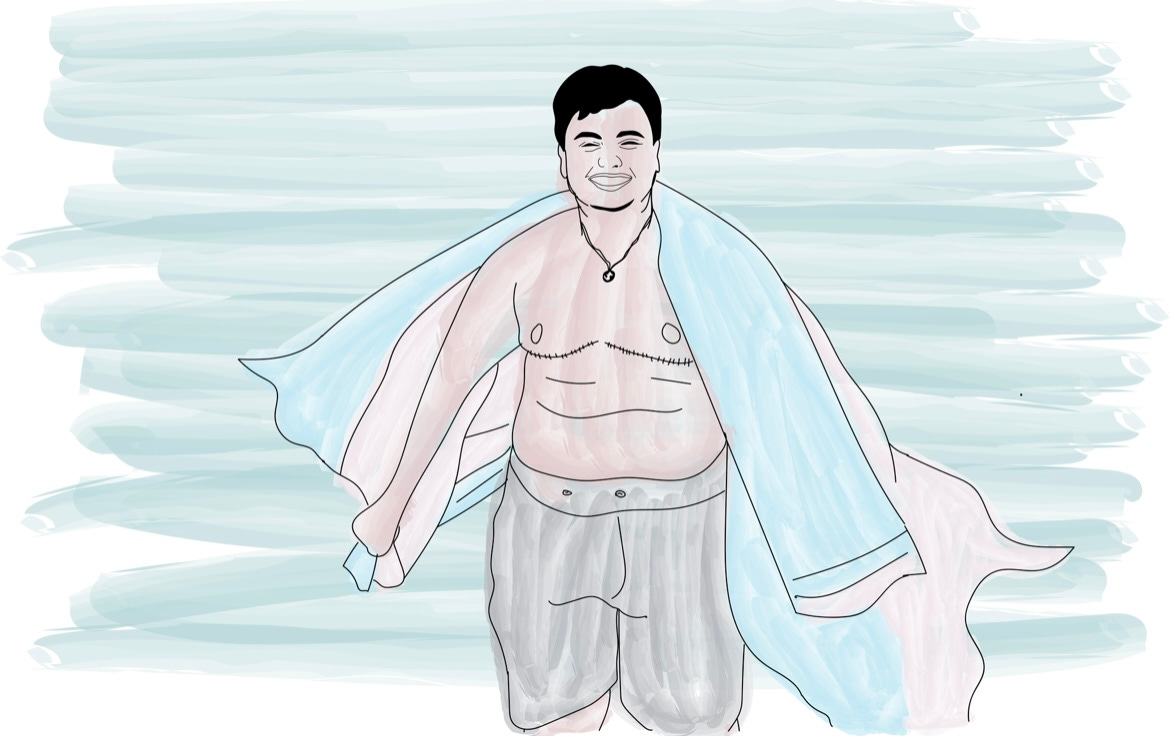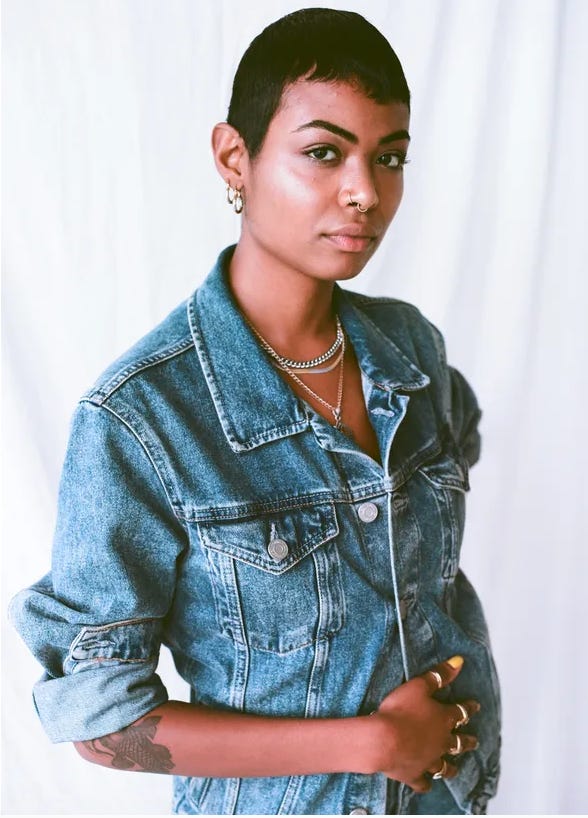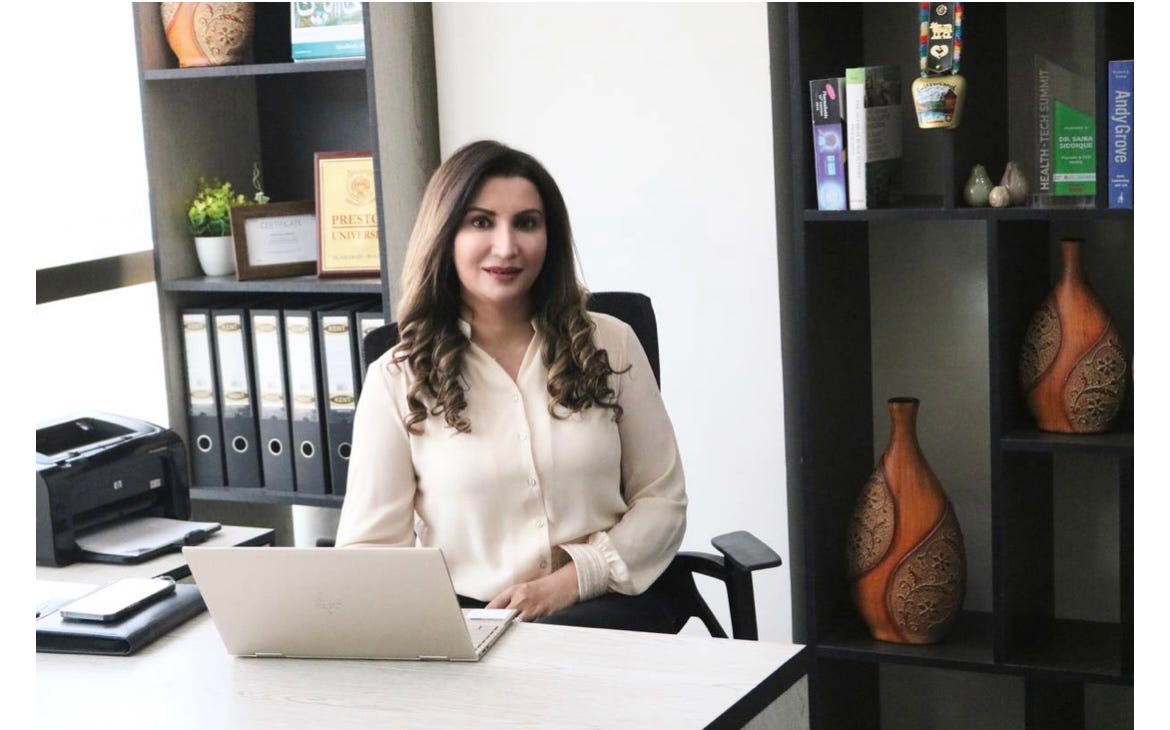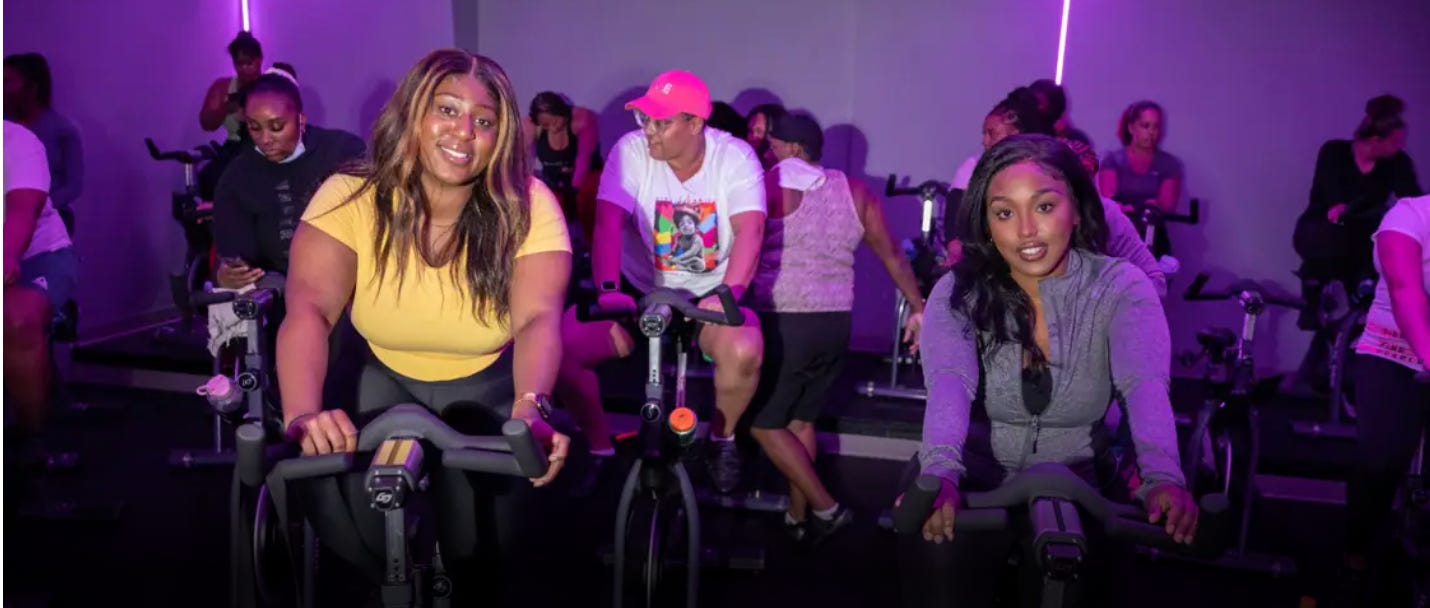Global Roundup: Moroccan Trans Community, LGBTQ Muslims, Women by Women Photo Exhibition, Pakistan Women in Health Tech, Fitness Group for Black Women
Curated by FG contributor Samiha Hossain
Illustration: Inge Snip via Open Democracy
Ghali Eden is an activist for trans rights in Morocco and the founder of the Instagram account Moroccan Transgender Community, which has over 1,000 followers and receives dozens of enquiries every week. Now 27 and living in Belgium for the past eight years, Eden says he has never seen another African trans man document their transition publicly.
I spent 19 years in Morocco, so it's my home. I don't want trans kids to feel the same way that I felt when I was a kid. - Ghali Eden
When Eden started university in Belgium, he began researching the possibility of transitioning. The distress of having to present as a girl led to his depression, which he says “came from Morocco and people who live in Morocco.” The pandemic and his worsening depression pushed him to start transitioning. He also set up the Moroccan Transgender Community where he shared his transition step by step, from his first testosterone injections to his double mastectomy. He shared both the challenges of the hormonal and surgical treatments he was undergoing, and the joy of getting physically closer to the man he always knew he was.
Homosexuality is illegal in Morocco, according to article 489 of the penal code of 1962, and punishable by up to three years in prison and a fine. A 2020 survey of members of the country’s LGBTQIA+ community found overwhelming agreement that the “social environment […] generally marginalizes and rejects them.” At least 70% reported being subject to some form of violence due to their sexual orientation. If he returns to Morocco, Eden could be imprisoned on the charge of homosexuality or “sexual deviancy”.
I'm really so sad about it because I’m a male in Belgium. But my papers in Morocco still use my dead name and female gender marker. - Ghali Eden
Eden says he receives 15 to 30 messages a week on Moroccan Transgender Community from people looking for advice and information. He thinks it is important to also reach parents of trans people too, as they can be allies. He advises trans teens to only come out to their families once they are financially independent. Transitioning in Morocco can be dangerous “without a proper health system that supports them and a legal frame that protects them.” Eden also reflects on the sad reality that migrating may be the only way a trans Moroccan can live safely, which of course, is not possible for many people.
Marwa Eltahir via USA Today
Marwa Eltahir and Hamzeh Daoud spoke to USA Today about being queer and Muslim. As the holy month of Ramadan comes to an end and Muslims around the world are gearing up to celebrate Eid al-Fitr, LGBTQ Muslims say they often feel left out, ostracized or forgotten.
Queer Muslims have always existed. Queer Africans have always existed. Queer Arabs have always existed. Queerness and queer people, Two-Spirit people, gender non-conforming people, all these identities are so historical and so embedded in our cultures. - Marwa Eltahir
Daoud came to study in the US on a student visa, but was unable to go back to Jordan after they shared they were queer and trans with their family. They were left to navigate a complex system of seeking asylum in the US all while being unable to work due to visa restrictions. Their experience inspired them to work on a survey with Queer Crescent aimed at gathering data on the LGBTQ Muslim community. Eltahir created "Our Political Home," a series that brings together queer African first-generation community members through storytelling.
Eltahir discusses how there is a myth that homosexuality is something that was imported or brought to the Muslim community, which is “historically false.” She also notes the misconception in the Muslim community that queerness is something that people choose.
In light of these myths and attempts to reconcile their Palestinian, Islamic identity with their queerness, Daoud began exploring the history of queerness and transness in Islam and stumbled upon poet Abu Nuwas who wrote about queerness in the 8th century.
There's queerness and transness that is rooted in Islamic tradition that might not be named queerness and transness, but it's very much on the sexuality and gender diversity expansiveness spectrum. - Hamzeh Daoud
Daoud does not think there's anything inherently wrong with Islam as a practice, but they do think there's something wrong with the ways the religion has been interpreted and wielded as a tool for power and suppression, which they know is not unique to Islam. Not only are LGBTQ Muslims forced to face homophobia within the Muslim community, they're also left to navigate Islamophobia. And for Black and African Muslims, racism too.
Eltahir notes that though there are many hardships that come with being a person of color, who's queer and Muslim, there are many other parts of her life that spark joy.
For many queer folks, including my self, our blood family can feel far away from our queer life and identity. Finding other queer people who accept me as I am, without condition has been one of the most healing experiences. - Marwa Eltahir
Le Thi Mong Thu (left) and Nguyen Thi Huong, close friends and members of the Kinh Lon village’s women’s group. Photograph: Yen Duong/ActionAid via Irish Times
Women by Women, a photography exhibition showcasing a range of professional female photographers from all over the world, launched earlier this week in Dublin. All images on display are taken by women and feature a range of women from across the world. Each photo tells a unique story and highlights climate change, feminism, and war.
Aida Sarr, photographed by self-taught Senegalese photographer, Ina Makosi, is a community development worker and a matron at the local “health hut” on the island of Maya, Senegal.
When I came here in 1998, there were a lot of trees, but today you can see for yourself that there are no more, and the grass has dried up due to the rise in sea level making the soil saltier. Sometimes, even our homes are submerged. - Aida Sarr, 40
Vietnamese photojournalist Yen Duong says she has been a big advocate for promoting local female photographers because women “are not visible at all.” With a background as an investigative journalist, Yen’s work explores themes such as human trafficking, climate change and the impact of urbanization on marginalized communities. She photographed farmers and close friends Thu and Huong, members of a village women’s group in the Mekong Delta region of southern Vietnam. The region is vulnerable to the impacts of climate change – the women used to grow rice but severe seawater intrusion has forced them to now tend water lily ponds.
The exhibition is developed by ActionAid, a charity focused on helping women and children in developing countries overcome the many challenges they face. The launch event included a panel discussion on dismantling bias, racism, and representation. The organization is committed to moving away from “traditional charity imagery that depicts people as objects of pity, helpless, desperate and without dignity.”
Saira Siddique, founder and CEO of health tech company medIQ, poses for a photo at her office in Islamabad, Pakistan on April 14, 2022. Picture courtesy: medIQ via Thomson Reuters
On a mission to make healthcare accessible to Pakistanis, Saira Siddique started the country’s first “virtual hospital,” MedIQ. With face-to-face doctors' appointments restricted due to contagion risks, Siddique's company, connecting patients across Pakistan with doctors and pharmacies, was suddenly in demand during the pandemic. MedIQ served 16,000 patients in its first six months. Almost two years on, the number has increased by nearly 20 times.
Running a startup business is like riding a bull. You never know which way or how hard it's going to buck. - Saira Siddique
ffat Zafar Aga and Sara Saeed Khurram's platform allows female medics to provide e-consultations from their homes to patients in mostly rural communities. The two entrepreneurs wanted to use the untapped potential of tens of thousands of so-called "doctor brides" – women doctors who quit their medical practice after marriage. They set up dozens of “e-health clinics” in low-income communities where, for as little as 80 rupees ($0.43), a patient visits a nurse who uses the online platform to reach a doctor. They also provided free consultations during COVID-19 after the government sought their help – a task made possible by their team of 7,000 doctors, many of whom are former doctor brides.
Amna Asif is the founder and CEO of ReliveNow, an online mental health care platform. The platform, whose clients are mainly women, surged in demand during the pandemic. Appointments can address issues from domestic violence to anxiety over job losses and grief of losing family members to Covid-19.
But the road to success for firms like MedIQ and Sehat Kahani has been paved with misogyny, stereotypes and discouragement. Business women say they have to work twice as hard to be taken seriously and are scrutinized far more than their male peers. Siddique said she had to pitch to nearly 140 investors – twice as many as men usually do. Aga has also had to decline several late night meetings over coffee or shisha.
There is a perception that women cannot start a successful business, let alone scale it up. - Saira Siddique
These biases and the misogyny is why so few women go into business in Pakistan. Asif faces a double bias, with investors reluctant to fund a startup that works on mental health in a country where there is still a lot of stigma associated with mental illness. ReliveNow, which largely survives on revenues, grants and awards, may be forced to shut shop. These women have used their passions to innovate and start companies that address important social issues – yet, they continue to face a myriad of additional obstacles.
Shanea Sparks and Lakara Whynder of North Preston, N.S., started Black Girl Fitness last month as a way to promote health and fitness in their community, while also providing a safe space for Black women to work out via CBC
Shanea Sparks and Lakara Whynder wanted to see a space where Black women could feel comfortable working out, and see themselves reflected in the room — so they created a group called Black Girl Fitness to fill a gap they've noticed in Halifax, Canada. Last month, they partnered with A Halifax gym to hold their first spin class, and promoted it on social media and through word of mouth in their community. They were blown away by the response.
We had messages for days telling us how much everyone loved the class. How everyone just loved being in this space, you know, full of Black women. It just felt very empowering. - Shanea Sparks
The two friends believe the unique energy in the room is partly why the class was so popular. They helped plan the class, and chose their favourite R&B and hip hop music to go along with the workout. They see it as “more of an experience than just a fitness class.”
When they held their second class, attendance numbers grew. Gabrielle Grant went to both the classes and plans to keep coming.
If I'm around people that look like me and women that support me and there's ... a support system in it, I feel welcome to come. I feel like there's a space for me. - Gabrielle Grant
Sparks and Whynder want any body type and fitness level to feel comfortable and respected in their classes. They plan to branch out to include new workouts in their Black Girl Fitness programming with the gym, and they said they're excited to make their events bigger and better. They are also considering opening up the classes to other women of colour, or even Black men in the future.
It's just super, super important for everyone to come in and not feel like intimidated ... getting people out and showing people around us that working out is fun. - Shanea Sparks
Samiha Hossain (she/her) is a student at the University of Ottawa. She has experience working with survivors of sexual violence in her community, as well as conducting research on gender-based violence. A lot of her time is spent learning about and critically engaging with intersectional feminism, transformative justice and disability justice.
Samiha firmly believes in the power of connecting with people and listening to their stories to create solidarity and heal as a community. She refuses to let anyone thwart her imagination when it comes to envisioning a radically different future full of care webs, nurturance and collective liberation.






